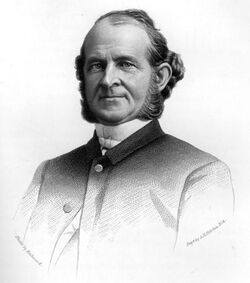Biography:George David Cummins
George David Cummins | |
|---|---|
 Bishop G. D. Cummins | |
| Born | Delaware, United States |
| Died | June 26, 1876 (aged 53) Lutherville, Maryland, United States |
| Alma mater | Dickinson College |
| Occupation | Religious leader |
| Organization | Reformed Episcopal Church (after c. 1873) |
| Known for | Founder of the Reformed Episcopal Church |
| Signature | |
George David Cummins (December 11, 1822 – June 26, 1876) was an American Anglican Bishop and founder of the Reformed Episcopal Church.
Life and career
He was born in Delaware on December 11, 1822. Cummins graduated from Dickinson College, located in Carlisle, Pennsylvania, in 1841,[1] and entered the Methodist ministry.
In 1845, he took orders in the Protestant Episcopal Church. After serving as rector of Episcopal parishes in Virginia, Washington, and Chicago , Cummins was appointed Assistant Bishop of Kentucky in 1866.[2]
A staunch Evangelical of Reformed doctrine, Cummins opposed the influences of Ritualism and the Anglo-Catholic Oxford Movement.[3] In 1873, he was criticized for receiving communion with ministers outside of the Protestant Episcopal Church and resigned his position. He then founded the Reformed Episcopal Church, of which he was the first presiding bishop, in New York City .[2]
Doctrine
Cummins' Evangelical theological persuasions led him to separate from the Episcopal Church, which had, in his mind, been poisoned by the ritualism of the Anglo-Catholic party. Before he left the Episcopal Church, Cummins as bishop engaged in a highly provocative Church service in which he presided alongside a Presbyterian clergyman, Dr. John Hall, over Holy Communion at Hall's Fifth Avenue Presbyterian Church.[4]
Cummins believed that if the pure Evangelical principles of the Reformation were to survive the sacramental and ecclessial[check spelling] theological complications and gaudy ornamentation of the Anglo-Catholic movement, Evangelicals of all denominations must unite. He sought "Evangelical Catholicity" based on the ideas of the "Muhlenberg Memorial," authored by the prestigious Evangelical Episcopalian, William Augustus Muhlenberg. "Strength to the Protestant cause," declared Muhlenberg, "is one of the objects of this movement [i.e., the Muhlenberg Memorial]." Those, "who are true to the Reformation standards" needed to present "a united phalanx against Rome," Muhlenberg explained.[5] Cummins embodied this charge. And when he could no longer in good conscience serve the Diocese of Kentucky due to Ritualistic advances, he left the Episcopal Church.
Bishop Cummins left the Episcopal Church due to conflict with Anglo-Catholic theology, one facet of which is the insistence on Apostolical Succession for valid ordinations. Cummins felt that such a high view of Episcopacy injured the objectives of the new Re-formed Episcopal Church, which, now formed, sought to provide a unified Evangelical haven for all Reformational Christians in the spirit of "Evangelical catholicity". Ironically, Cummins, who preached against a high view of Apostolic Succession, was unwilling to part with it. When he left the Episcopal Church, and before he was deposed, he rushed to consecrate another bishop, the somewhat controversial Charles Edward Cheney, as the second bishop of the Re-formed Episcopal Church.[6] Thereafter, the Reformed Episcopal Church's orders remained as apostolically valid as any of the Anglo-Catholics.[citation needed] They retained a high practice, despite a low view.
Death
Cummins died in Lutherville, Maryland, on June 26, 1876.[7]
See also
- Cummins Memorial Church
- List of Dickinson College alumni
- List of founders of religious traditions
- List of people from Chicago
- List of people from Delaware
- List of people from Kentucky
- List of people from New York City
- List of people from Virginia
- List of people from Washington, D.C.
References
- ↑ "George David Cummins (1822-1876)."
- ↑ 2.0 2.1 "George David Cummins", in the New International Encyclopedia, 1928, Vol. 6.
- ↑ Price, Annie Darling (1902). A History of the Formation and Growth of the Reformed Episcopal Church. Philadelphia: J.M. Armstrong (via Google Books). p. 27ff.
- ↑ Guelzo, Allen (2010-11-01). For the Union of Evangelical Christendom. University Park, PA: Penn State Press. p. 127. ISBN 9780271042022. https://books.google.com/books?id=3IrvLWp71vUC&pg=PA127. Retrieved 2021-02-04.
- ↑ Guelzo, Allen (2010-11-01). For the Union of Evangelical Christendom. University Park, PA: Penn State Press. p. 123. ISBN 9780271042022. https://books.google.com/books?id=3IrvLWp71vUC&pg=PA123. Retrieved 2021-02-04.
- ↑ Guelzo, Allen (2010-11-01). For the Union of Evangelical Christendom. University Park, PA: Penn State Press. p. 201. ISBN 9780271042022. https://books.google.com/books?id=3IrvLWp71vUC&pg=PA201. Retrieved 2021-02-04.
- ↑ "George David Cummins". Appletons' Cyclopædia of American Biography (via Google Books).
Publications
- Alexandrine Macomb Cummins (Mrs. G.D. Cummins). Memoir of George David Cummins (New York, 1878).
- Historical material by and about Cummins from Project Canterbury
 This article incorporates text from a publication now in the public domain: Gilman, D. C.; Peck, H. T.; Colby, F. M., eds (1905). "article name needed". New International Encyclopedia (1st ed.). New York: Dodd, Mead.
This article incorporates text from a publication now in the public domain: Gilman, D. C.; Peck, H. T.; Colby, F. M., eds (1905). "article name needed". New International Encyclopedia (1st ed.). New York: Dodd, Mead.- Allen C. Guelzo, For the Union of Evangelical Christendom: The Irony of the Reformed Episcopalians (Penn State Press, 2010)

